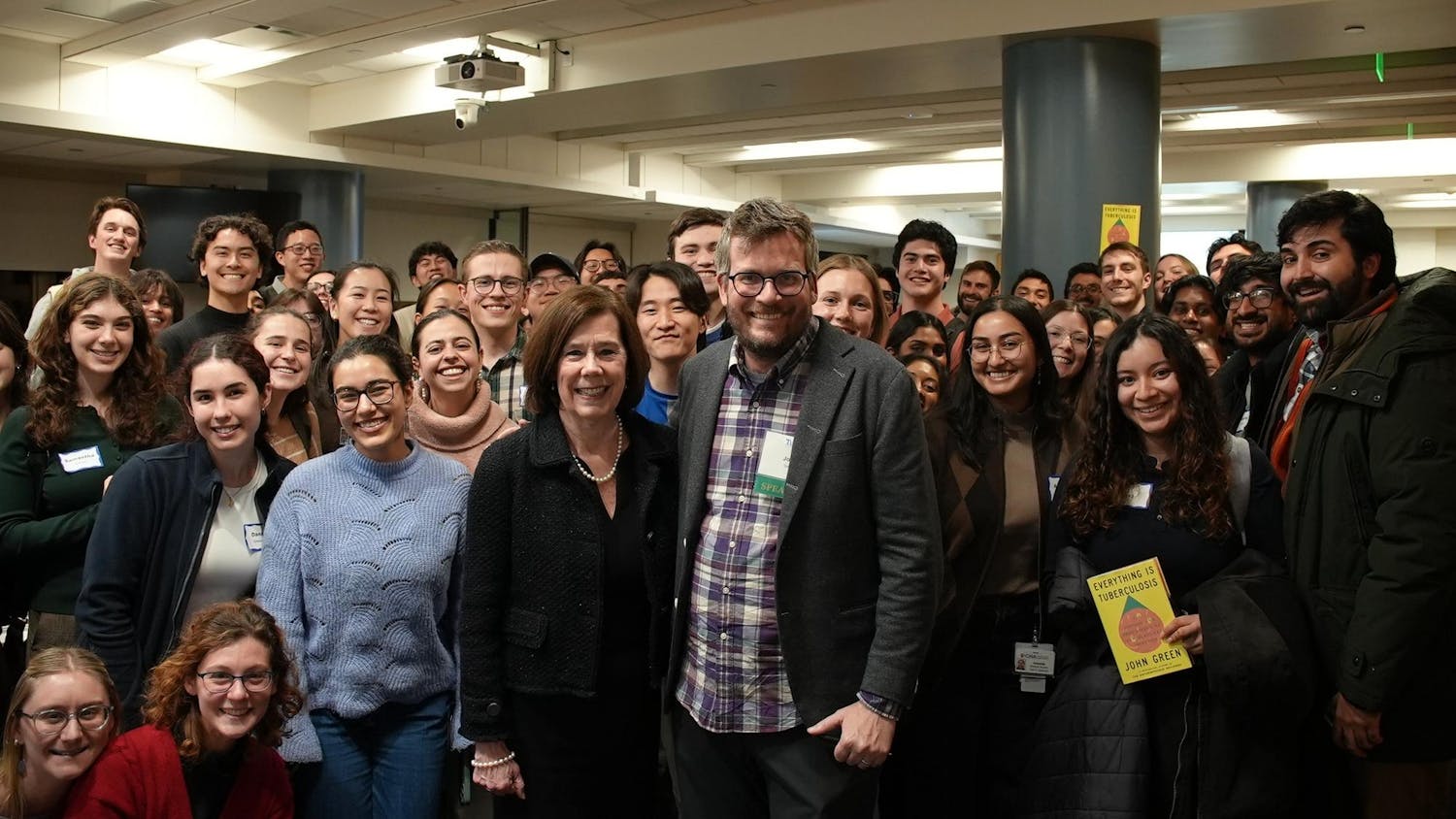This past summer, six members of Tufts’ Engineers Without Borders traveled to Solomoni village in Malawi to install a water tower system at the Chigumukire primary and secondary schools. The new system provides running water to the schools, so the facilities now feature sinks as well as showers. This allows students to practice better hygiene — and also enables them to conduct experiments in their science laboratory.
The current co-president of EWB described how the water system works.
“It’s basically a 10,000-liter tank on top of a tower that uses a gravity-fed, pressure-driven system to provide water to taps throughout their school layout,” Julia Zelevinsky, junior and EWB co-president, said.
Tufts EWB started the Malawi project long before any current members had even begun college. Previous members of EWB traveled to Solomoni in 2017 to survey initial infrastructure and install boreholes: deep, narrow holes that are drilled into the ground to reach water that can then be accessed by a hand pump.
When juniors Max Harrington, Natasha Wan and Julia Zelevinsky joined EWB as first-years, membership had steeply dropped off. But, thanks to new leadership, the club has been reinvigorated and is stronger than ever.
“There were maybe like five to 10 people going to the club, and now we have more than 80 people that are coming on Tuesday nights, which has been really exciting,” Zelevinsky said.
These three EWB members all emphasized that to engage with the club, students do not need to have engineering backgrounds or even STEM majors.
“Something that’s really cool about Engineers Without Borders is that it bridges together people from so many different majors because there is community health, there’s IR … [and] it really allows you to connect with the community,” Zelevinsky said.
Tufts EWB does not receive funding from the national EWB organization but rather pays a fee of $2,250 to the organization every year.
“They just help us connect,” explained Harrington, who is the co-project lead of the Malawi chapter.
Thanks to the help of the School of Engineering, the club is able to cover that fee. Because of the investment into EWB, Zelevinsky said, the group wants to ensure that “the partnership is meaningful.”
Although only six members of EWB traveled to Malawi for the installation, the Malawi project itself has around 10-15 people who worked to make the project happen. Students discussed and identified specific community needs, coordinated with local Malawian firms and figured out funding.
“We have to outsource the construction to a local firm, but we do a lot of the fundraising. We have a lot of fundraising events,” Katie Casey, sophomore and EWB internal outreach director, said. “We apply to a lot of grants, [and] we get funding from TCU.”
EWB connected to the Solomoni community through a local nonprofit called Joshua Orphan and Community Care — which had previously built a relationship with the schools in the area.
“The [nonprofit] is a great way to connect with [the community] and make sure that we’re really hearing their needs and working with them,” Zelevinsky said.
Harrington echoed the group’s appreciation for Joshua Orphan and Community Care and expressed that the two will hopefully continue to collaborate in future projects.
“We really love our [partners]. … We don’t want to come in with a project that we want to solve, necessarily,” Harrington said. “We would rather them be like, ‘Hey, here’s a project we’re looking for.’”
Wan, co-project lead of the Malawi chapter, noted that their work in the Solomoni Village addressed only one of many challenges faced by people in the region.
“Families seem to have [fewer] health issues, but it does seem like hunger is still an issue,” she said.
Zelevinsky also emphasized that their work in Malawi is not done. An EWB team plans to return to Malawi this summer to check in on the water system and make sure it is functioning properly.
“We’re going to do an assessment, seeing what projects we could do there [by] meeting with the community members there and really laying the foundation for a new project,” she said.
Each of these students spoke with excitement about their two weeks in Malawi. The highlight of the trip? Spending time with people in the Solomoni community and learning phrases in Chichewa, the language spoken there.
“They’re the friendliest people you’ll ever meet,” Casey said.
Now the group is eager to bring what they learned in Malawi back to the Tufts campus. Within EWB, there is a Malawi spinoff project — not sponsored by EWB national — that consists of 60-75 people. In this cohort, there are eight “tech groups” working to build a greenhouse at Tufts that could be used by Tufts community members as well as those in the broader Medford/Somerville area.
For example, one project plans to incorporate solar technologies used in Malawi and plant crops that are native and common to the region. The students were also inspired by the system the schools used to capture rainwater.
“When we were there, we saw a lot of the teacher housing had rainwater catchment basins just off the roof,” Casey said. “So, we’re incorporating that for our project.”
The greenhouse construction will begin in full after spring break. The club also plans to host a 6k running fundraiser on April 7.
“The average distance that women in sub-Saharan Africa have to walk to get water is 6k,” Zelevinsky explained. “We tried to do that to represent how we can so easily get access to water, but for a lot of people, that’s not their reality.”
The group hopes that the greenhouse will combine hands-on engineering with education about Malawian culture. They also plan to extend that education beyond college student participation. The greenhouse team will work with kids from Tufts’ Eliot-Pearson Children’s School and will also reach out to local elementary schools in the Medford/Somerville area.
Wan expressed excitement about this collaborative component.
“College kids don’t get to see both 30-year-olds or little kids that much, and I think it will just be cool to have that intergenerational connection that we kind of lack as college students,” Wan said. “The greenhouse will be a great place for that.”






